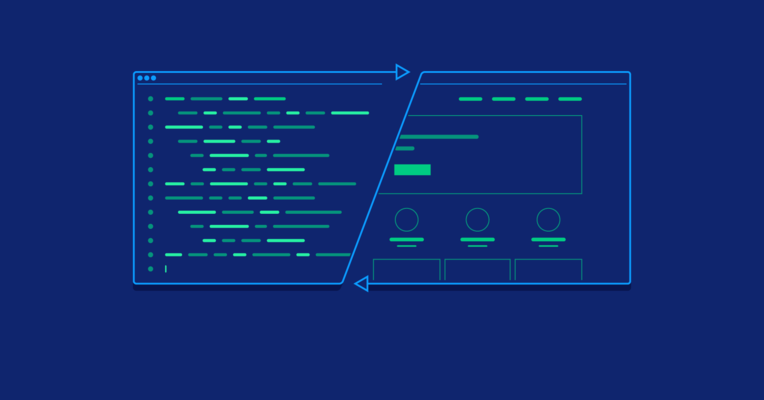The Demand for Squarespace Developers Continues to Rise
A company’s website is frequently the primary point of contact between its brand and its audience. Whether launching a new venture, building an e-commerce platform, or refreshing a portfolio, businesses today need websites that are visually appealing, adaptable, and easy to maintain. Squarespace offers an intuitive, user-friendly interface and a robust all-in-one platform, empowering businesses to launch sleek websites without the need for complex backend development. As of June 2025, the platform hosted more than 344,000 active online stores, growing 14% year-over-year.
Despite Squarespace’s promise of simplicity, building a high-performing website that excels across SEO, user experience, accessibility, and brand alignment requires the expertise of a qualified Squarespace developer. Top-notch developers help companies go beyond the conventional by extending e-commerce capabilities, integrating third-party tools, optimizing for search, customizing templates, and injecting custom code. As the platform evolves with new APIs, developer tools, and advanced features, so too does the challenge of finding developers who can create and maintain truly standout sites.
This guide will help you navigate the hiring process by clarifying what distinguishes high-performing Squarespace specialists, which complementary skills matter, and how to assess the right fit for your project or organization.
What Attributes Distinguish Quality Squarespace Developers From Others?
The best Squarespace developers are more than just proficient users of a drag-and-drop interface. They are creative problem-solvers with a strong sense of web design and visual aesthetics, a sharp understanding of performance and SEO fundamentals, and the technical fluency to push the platform beyond its native capabilities.
Quality Squarespace professionals understand that websites don’t exist in a vacuum, but they are products of business goals, brand identity, and audience behavior. These professionals build with purpose. Rather than simply choosing the flashiest template or plugging in default blocks, they take time to understand a client’s brand, evaluate the best structure for the content, and ensure that every page, section, and interaction supports a clear user journey, aligning design choices with specific business needs.
Top-tier Squarespace experts are comfortable working with custom code when the native builder falls short. They know how to safely inject CSS and JavaScript to tweak layouts, animations, or interactions. They might use JSON-T and the Developer Platform to push beyond standard limitations, creating custom collections, filtered blog archives, or headless integrations where necessary. And they understand the underlying content management schema that powers Squarespace sites: how blocks relate, how sections nest, and how dynamic content can be reused effectively.
But what really separates a seasoned Squarespace developer is their holistic approach. They think like UX designers, marketers, and SEO analysts all at once. They know how to optimize load times, compress and format media, write semantically correct HTML markup, and structure content for both accessibility and discoverability. Their sites don’t just look great, but they perform well, convert users, and display seamlessly across mobile devices, screen readers, and search engines.
Importantly, great Squarespace developers work effectively with branding teams, copywriters, photographers, and marketers to translate static assets into a dynamic and on-brand web presence. They’re comfortable navigating ambiguous requirements, asking the right questions, and proposing design solutions that balance form with function. They don’t simply assemble a new website: they build a custom design and digital experience that reflects and amplifies the client’s voice.
Complementary Technology Skills for Squarespace Developers
While a deep understanding of Squarespace’s builder is core, exceptional Squarespace specialists bring a wider set of web development and creative skills that allow them to create versatile, high-performing websites.
Advanced CSS Customization: Top Squarespace developers can go far beyond theme settings. They know how to write modular CSS that overrides default styles without breaking updates or conflicting with built-in class names. This allows for greater control over typography, responsive behavior, animations, and layouts.
JavaScript Enhancements: Whether it’s adding accordion components, lightboxes, interactive charts, or scroll-triggered animations, JavaScript is the key to extending Squarespace’s visual toolkit. Skilled developers can safely enhance the front-end and inject custom JavaScript in code blocks or site-wide headers while avoiding performance pitfalls.
JSON-T and Developer Mode Proficiency: With Squarespace 7.1+, developers use JSON-T for templating and understand how content types and collections are structured. Familiarity with Developer Mode is a major asset for building highly customized templates or integrated components like custom product detail pages.
SEO and Performance Optimization: SEO on Squarespace is both an art and a science. Standout experts understand how to manage structured data, alt tags, metadata, semantic HTML, canonical tags, and image optimization. They also use tools like Google Lighthouse to analyze site performance and improve Core Web Vitals and page speed scores.
E-commerce Implementation: Many businesses rely on Squarespace Commerce to sell products, subscriptions, or services. Developers with experience configuring product variants, automating tax and shipping rules, integrating Stripe and PayPal, and customizing cart and checkout experiences can provide significant value.
Third-party Integrations: Skilled Squarespace developers can easily connect the site to external platforms using scripts, API connectors, or embed code, whether it’s integrating Calendly, Google Analytics, or Mailchimp, or syncing with external CRMs.
Accessibility Best Practices: Top-tier developers design with inclusivity in mind. They structure content for screen readers, ensure proper contrast ratios, test keyboard navigability, and avoid common accessibility pitfalls.
Content Strategy and UX Thinking: More than just builders, skilled professionals understand how to structure pages for clarity and engagement. They know how users scan content, how calls to action work, and how visual hierarchy affects interaction. They often advise on site navigation, landing page layout, and information architecture.
How Can You Identify the Ideal Squarespace Developer for Your Project?
Hiring the right Squarespace developer depends on the scope and goals of your website development project. Whether you’re launching an informational website or a complex digital storefront, aligning the developer’s skills with your technical needs and brand vision is essential. Below are key considerations to help you make an informed hiring decision.
Match Skills to Project Complexity
Are you building a professional portfolio? A lead-generation site? Or a full-scale e-commerce store with hundreds of products? The complexity of your project determines the expertise you need. For simple sites, a developer familiar with Squarespace’s basic tools may suffice. For complex projects—like multi-language sites, large product catalogs, or integrations with third-party services—look for developers experienced with Squarespace’s developer platform and web standards, depending on your specific project needs.
Prioritize Technical Fluency and Communication
Entry-level developers might handle basic template edits or styling tweaks, while senior developers with years of experience should be comfortable extending Squarespace functionality safely with custom code, managing site performance, and troubleshooting. Communication matters: ideal developers ask questions, propose solutions, and explain when to favor native features over custom work. Since Squarespace projects often involve remote collaboration, seek developers who document clearly, work independently, and offer post-launch support or training.
How to Write a Squarespace Developer Job Description
A compelling job description should go beyond listing tools or generic responsibilities. It should tell a story about your brand, your digital goals, and the type of collaborator you’re looking for. Start with a quick overview of your company and the purpose of the website. Whether you’re launching a direct-to-consumer brand, redesigning an existing site, replatforming a legacy system, or developing a thought leadership hub, explain what the developer will be expected to bring to life.
Be explicit about which version of Squarespace you’re using (typically 7.1), and whether you need Developer Mode or custom CSS/JavaScript. Mention any critical features—blogging, e-commerce, gated content, scheduling integrations, or API connectivity—so developers can assess the technical fit.
Describe your team structure. Specify whether a designer will provide mockups or if the developer will interpret brand assets and moodboards into interactive layouts. Clarify whether the content is ready or if the developer will contribute to the content strategy and layout.
Define what success looks like. Is it a site that loads in under two seconds? Ranks on the first page of Google for key terms? Converts visitors into leads or buyers? The more specific you are, the easier it is for the developer to match their approach to your expectations.
Finally, be transparent about how the engagement will work. Set expectations around timeline, design priorities, and communication. Indicate whether the developer will work directly with stakeholders or via a project manager. This helps establish a shared understanding of process and accountability from the start.
What Are the Most Important Squarespace Developer Interview Questions?
Interviewing Squarespace developers requires more than confirming they can use the platform. The interview is your chance to understand how they solve problems creatively and collaborate with teams. The questions below are designed to assess technical fluency, decision-making, and the ability to deliver results aligned with business goals.
Can you walk us through a Squarespace site you built that required custom code or integrations?
A strong response will reveal technical savvy and strategic judgment. Top candidates will explain where Squarespace’s native tools came up short, how they identified the limitations, and what custom code or third-party tools they used to bridge the gap. Look for clear reasoning behind their decisions, especially around extensibility, performance, or client-specific requirements.
Strong candidates will have a platform-native mindset and a broader understanding of web optimization. Look for mention of heading structure, alt text, image compression, and efficient use of Squarespace’s SEO settings. Top developers will explain how they balance aesthetics with speed, minimize render-blocking elements, and adapt their strategies to the site’s goals and audience. Bonus points if they’re adept at using tools like SEMrush or PageSpeed Insights to validate their work.
Have you ever worked in Developer Mode or used JSON-T to build custom templates?
Not all Squarespace developers go beyond the WYSIWYG interface, so this is where technical fluency matters. Candidates who can speak confidently about working in Developer Mode, setting up Git-based workflows, customizing collection pages, and using JSON-T to loop through data are likely operating at an advanced level. Ideally, they can also explain when it makes sense to use these tools—such as for customized designs, dynamic content structures, or client needs that go beyond what the standard editor allows.
How do you handle content updates or handoff to non-technical users?
This reveals how well a developer considers the long-term usability of their work. Strong candidates will talk about building with maintainability in mind. They’ll use clear naming conventions, reusable layouts, and minimal custom code when possible. The best also provide lightweight documentation or training to ensure clients or teammates can confidently manage content after launch.
What are some limitations of Squarespace, and how do you work around them?
No platform is perfect, and strong developers should be candid about where Squarespace falls short. They might mention limited dynamic filtering, restricted checkout customization, or difficulty managing multilingual content. Listen for examples of creative problem-solving, such as integrating third-party tools, using code injections, or adjusting client expectations through smart UX and content strategy.
Why Do Companies Hire Squarespace Developers?
Companies hire Squarespace developers to bridge the gap between quick-start templates and fully tailored digital experiences. While the platform makes building a basic site accessible to almost anyone, leveraging its full potential—and avoiding common performance, UX, or SEO pitfalls—requires expertise.
A skilled Squarespace developer brings polish, strategy, and problem-solving to every stage of the website build. They ensure your site not only looks good but also performs well across devices and channels. They know how to structure content for clarity, build pages that convert, and troubleshoot issues that non-specialists might never notice until it’s too late.
Just as important, they help future-proof your investment. By building maintainable sites and training your team to make edits with confidence, they create sustainable digital assets that support growth rather than hinder it.
In a world where your Squarespace website is often the first impression—and sometimes the entire customer experience—expert developers help turn a templated platform into a competitive advantage.


























